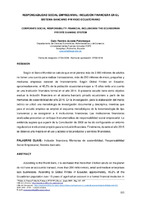Responsabilidad social empresarial : inclusión financiera en el sistema bancario privado ecuatoriano
Corporate social responsibility : financial inclusion in the ecuadorian private banking system
Abstract
Según el Banco Mundial se calcula que en el planeta más de 2.000 millones de adultos no tienen una cuenta para realizar transacciones, más de 200 millones de micro, pequeñas y medianas empresas carecen de financiamiento. Según Global Findex en Ecuador, aproximadamente, el 46,2% de la población ecuatoriana mayor a 15 años tenía una cuenta en una institución financiera formal en el año 2014. El presente estudio tiene como objetivo evaluar la inclusión financiera en el sistema bancario privado ecuatoriano a partir de las memorias de sostenibilidad del año 2016. En la investigación, para la elaboración del marco teórico se utilizó una metodología de investigación documental y descriptiva, mientras que para el estudio empírico se empleó el esquema metodológico de la fenomenología de tipo transversal y se escogieron a 4 instituciones financieras. Las instituciones financieras analizadas presentan un enfoque instrumentalista de responsabilidad social empresarial. La evidencia sugiere que a partir de la Constitución de 2008 se ha ido configurando un entorno regulatorio e institucional propicio para la inclusión financiera. Finalmente, durante el año 2016 se observa una mejora en el uso y acceso a los productos y servicios financieros. According to the World Bank, it is estimated that more than 2 billion adults on the planet do not have an account to transact, more than 200 million micro, small and medium enterprises lack businesses. According to Global Findex in Ecuador, approximately, 46.2% of the Ecuadorian population over 15 years of age had an account in a formal financial institution in 2014. The objective of this study is the financial inclusion in the Ecuadorian private banking system based on the sustainability reports of the year 2016. In the research, a methodology of documentary and descriptive research was used for the elaboration of the theoretical framework, while for the empirical study the methodological scheme of the transversal-type phenomenology was used and 4 financial institutions. The analyzed financial institutions present an instrumentalist approach to corporate social responsibility. The evidence suggests that, starting with the 2008 Constitution, a regulatory and institutional environment for financial inclusion has been formed. Finally, during 2016 there was an improvement in the use and access to financial products and services.
URI
https://hdl.handle.net/20.500.12219/2481https://doi.org/10.36995/j.visiondefuturo.2019.23.01.003.es
https://visiondefuturo.fce.unam.edu.ar/index.php/visiondefuturo/article/view/302/115
Collections
- Revista Visión de Futuro [502]
The following license files are associated with this item:




